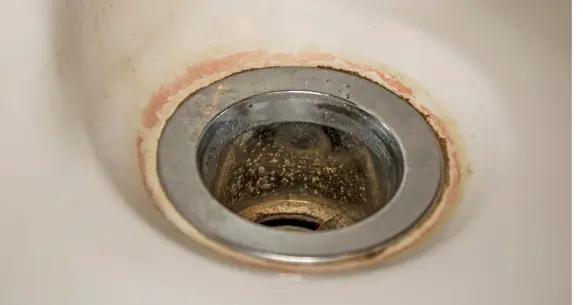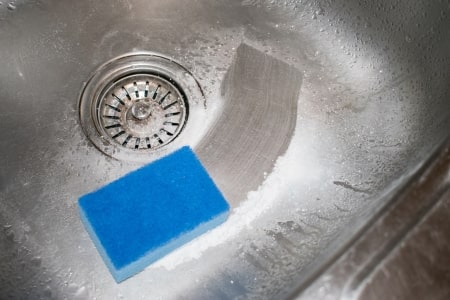How To Remove Hard Water Stains From Porcelain Sink?
Disclosure: Faucetshowerguide.com is reader-supported. We may receive commissions from purchases made via our links at no additional costs to you.
Porcelain sinks look very nice when they are new. But over time, hard water can leave stains on the sink. These stains take away the pretty, glossy look of the porcelain.
It’s common to get hard water stains on sinks. Sinks have water on them a lot, so stains can build up. The stains show up easily on the smooth, white surface of a porcelain sink.
If you see these spots and stains, don’t worry! You can get your porcelain sink looking shiny and new again.
There are good cleaning methods to remove the hard water stains. Follow the steps in this guide to safely take away the stains. With a little effort, you can get the sink looking beautiful once more.
On Sale
- Simple design, easy to use, and maintain
- Powerful jet spray and affordable price
- Durable long-lasting finish
Why Do Hard Water Stains Build on Porcelain Sinks?
First of all, hard water contains high levels of minerals such as calcium and magnesium. These minerals are picked up by the water as it flows through underground aquifers and rock formations.
When you use this water for cleaning or washing, it can leave behind deposits of these minerals on surfaces that it comes into contact with such as on porcelain sinks, faucets, etc.
Now, you might be thinking, “But why do these mineral deposits mostly seem to build up on porcelain sinks?” That’s a great question.
The reason has to do with the fact that porcelain is a porous material. This means that it has tiny little holes and crevices that allow minerals of water to seep into its surface.
When hard water drips onto its surface, the minerals in it start to dissolve and seep into pores.
Over time, these minerals accumulate and begin to form a layer of scale buildup. As more and more water drips, this buildup gets thicker and thicker until it becomes visible as a white or off-white film.
It’s not just the minerals themselves that cause problems either. The buildup of scale can also attract dirt and grime, which can make it even harder to remove. If left unchecked, it can eventually cause clogs and damage to plumbing systems.
How To Remove Hard Water Stains From Porcelain Sink?

Removing hard water stains from the Porcelain sink is not as hard as it seems. A little bit of effort with the right cleaning methods will make the sink look shiny and new again. With these below tested safe cleaning methods, you can get a porcelain sink looking as good as new in no time.
Method 1. Use Non-Abrasive Cleaner
We can use common household items like lemon juice, baking soda, and vinegar to clean our sink. You might not even need any special cleaning products.
- To clean with Vinegar, you can use a mixture of vinegar and water.
- For this, we have to take 2/3 part of the water and 1/3 part of the vinegar and mix it well.
- Now put this mixture where there is a mark of hard water and leave it for a few minutes.
- With the help of a sponge, clean the area where the vinegar is applied by rubbing it thoroughly
- Now wash the porcelain sink with clean water and clean it with a dry cloth.
Method 2. Clean With Bleach
Bleach is a good cleaner to remove hard water stains from the porcelain sink. Bleach breaks down those minerals that cause hard water stains.
To use bleach to clean hard water stains from porcelain, you will need:
- Bleach
- Water
- A spray bottle
- A soft cloth
- A scrub brush (optional)
Mix equal parts of bleach and water into the spray bottle. Mix well both into the bottle and then spray this mixture on the stained parts of the sink.
Now let sit it for a few minutes, so bleach will do its magic and start removing stains from the sink.
After a few minutes have passed, take a soft cloth and clean the stains with the cloth. Maybe some stains are stubborn and won’t wipe away with a cloth. In this situation, you need to scrub stains with a soft brush to clean them.
Once stains are gone, rinse the sink with clean water so any residual bleach will be cleaned and your porcelain sink will look as new.
Note: Don’t use the beach on colorful porcelain sinks. It will decolor the sink.
Method 3. Use of Hydrogen Peroxide
Hydrogen peroxide is one of the best cleaners to clean stains from the porcelain sink. Hydrogen peroxide is a powerful oxidizing agent that breaks down the bond of particles in the stains and makes it easy to remove the stains.
Take a clean cloth and pour hydrogen peroxide on it. Then rub the cloth in a circular motion on the stains. Make sure you rub it on the whole stained area. When you see there is no stain, rinse the area with water. If stains are tough, you may need to repeat the process several times. Hydrogen peroxide will make your porcelain sink stain-free.
Method 4. Remove Stains With Baking Soda
There are many cleaners to clean stains from a porcelain sink but baking soda is one of the most effective and inexpensive ways. Baking soda is a natural cleaner so you can use it without any worry. It won’t damage the color of the sink.
Begin by mixing together equal parts of the baking soda and water. Create a paste from this mixture. Apply this paste on the hard water stains of the porcelain sink and let it sit for several minutes.
After a few minutes, use a cloth or sponge to scrub the stains. If stains are hard, you can use a toothbrush to clean the stains. At last, when the stains are gone, rinse the porcelain sink with clean water.
Baking soda is a gentle cleanser so you can repeat this process several times without worrying about sink finish damage.
Method 5. Combination of Baking Soda and Vinegar
Baking soda and vinegar are common household items and natural cleaners. When we mix both cleaners, their paste will become powerful and remove those pesky stains from the porcelain sink.
Mix both cleaners in an equal quantity and create a paste. Apply this paste on hard water stains on the porcelain sink. let sit the paste for a few minutes on the stains.
Now take a sponge and scrub it on the stains. The baking soda will work as a gentle abrasive, while the vinegar will help to break down the bond of stains. Rinse the stains with clean water to get a shiny sink.
Method 6. Use Lemon Juice
If you have ever tried to clean hard water stains, you know how frustrating they can be. No matter how much scrubbing you do with water, they will never completely clean from the sink.
But with lemon juice, it is no harder to remove hard water buildup from the porcelain sink.
Lemon juice is a naturally acidic substance. So it is safe and easily removes hard water buildups.
Its use is very simple. Take a lemon and cut it in half. Now rub the lemon on the stains for a few minutes. It will make stains loosen. So, when you rinse the sink with water, all stains will be wiped away.

Method 7. Tartar and Vinegar
Another good combination of cleaning agents for porcelain sink cleaners.
- Take an equal part of both cleaning agents and mix well.
- Take a sponge and put it in the mixture and then rub it on the surface of the sink.
- Rub it for minutes and then let it settle for a few minutes and then clean it with water.
Method 8. Tartar and Hydrogen Peroxide
Tartar can be used with hydrogen peroxide to remove stains from porcelain sinks. The process of using it is the same as tartar and vinegar, mix both in the same quantity rub it with a sponge on the sink, and clean it with water.
Method 9. Pumice Stone
Pumice stone is made of a volcano. It looks like pieces of rock. It may scratch the body of the sink, so it is advised to use it carefully. Don’t use it on thin stains.
Take a pumice stone and rub it on stains gently with a soft hand. Before starting to rub, wet the pumice stone. Rub it into a circular motion.
Method 10. Polish Porcelain
When you remove the stains from the sink and the sink starts glowing well, then apply oil on it so that the water will stick less on it. Which will reduce the chances of getting spots and stains? The polished faucet will also look new.
Why is Vinegar Not Removing Hard Water Stains?

Vinegar is effective in dissolving and removing minerals such as calcium carbonate, magnesium hydroxide, and iron oxide. However, if the hard water stains are caused by other types of minerals, such as silica or aluminum, vinegar may not work as well.
The strength of vinegar can vary depending on its concentration. Common household white vinegar has a concentration of around 5% acetic acid, which may not be strong enough to effectively remove stubborn hard water stains.
Using a more concentrated form of vinegar, such as industrial-grade vinegar with a higher concentration of acetic acid, may be more effective.
If you’re only applying vinegar for a short time before rinsing it off, it may not be long enough to fully dissolve the minerals causing the stains.
Can You Use Baking Soda and Vinegar on The Porcelain Sink?

Yes, you can use baking soda and vinegar on a porcelain sink, but it’s important to use caution and follow some guidelines to avoid damaging the sink.
Before applying the baking soda and vinegar mixture to the entire sink, test it on a small, inconspicuous area to ensure it won’t damage the finish.
Avoid using abrasive scrubbers or sponges, as they can scratch the porcelain surface. Instead, use a soft-bristled brush or a non-abrasive scrubber to apply the mixture.
Does Vinegar Damage Porcelain Sinks?
Vinegar can potentially damage porcelain sinks if used improperly or in high concentrations.
Porcelain sinks are made from a type of ceramic material that is coated with a layer of glaze to give it a glossy finish. The glaze can be vulnerable to acidic substances like vinegar, which can break down the glaze over time and cause etching or discoloration.
However, diluted vinegar solutions (typically 50/50 with water) are generally considered safe for cleaning porcelain sinks.
Always mix vinegar with an equal amount of water before applying it to the sink. This will reduce the acidity of the solution and minimize the risk of damage.
It’s important to use a soft cloth or sponge to wipe down the sink after applying the vinegar solution, rather than scrubbing or rubbing vigorously, which can scratch the surface.
What is the Best Whitener For Porcelain Sinks?
There are several options for whitening porcelain sinks, and the best one for you will depend on the severity of the staining and the type of sink you have.
- Baking soda and hydrogen peroxide
- OxiClean
- Bar Keepers Friend
- CLR
- Muriatic acid
Frequently Asked Questions
Will CLR Hurt Porcelain Sink?
CLR is a powerful cleaning agent that is used to remove tough stains and grime from appliances. It is highly acidic so it may damage shiny surfaces like porcelain.
If you are going to remove stains from a porcelain sink with CLR, be sure to use its less quantity and after cleaning rinse the sink thoroughly with clean water to neutralize the remaining chemicals of CLR in the sink.
What Should You Not Use on a Porcelain Sink?
If you want to keep your porcelain sink finish safe from damage, there are a few things that you should avoid. Harsh chemicals and abrasive cleaners are not good for the porcelain sink finish. They will damage it. You should avoid all those things that can scratch or damage the porcelain finish.
Can You Use a Magic Eraser on Porcelain?
Yes, you can use a magic eraser on porcelain. Porcelain is a non-porous type of material and is very strong. Magic erasers are made of a me
Does Boiling Water Damage The Porcelain Sink?
Boiling water itself should not damage a porcelain sink. Porcelain is a type of ceramic material that is known for its durability and resistance to heat. In fact, porcelain sinks are often preferred in kitchens because they can withstand the high temperatures of hot water and steam without cracking or damaging.
Final Words
Hard water is not good for any surface. Due to its minerals, it makes the surface dull and makes stains on it. In this article, we have covered all the methods to remove hard water stains from porcelain sinks and faucets. Some methods are easy to use but, in a few methods, you should take care of sink color. After using these methods your porcelain sink will definitely shine like a new sink.
Check Related Articles –

Meet Ralph Matthews, father of 2 cute daughters and a skilled plumber with over 10 years of experience in the industry. Ralph has particular expertise in repairing any type of faucet and has helped countless homeowners and businesses solve their plumbing problems with his expert knowledge and attention to detail.










